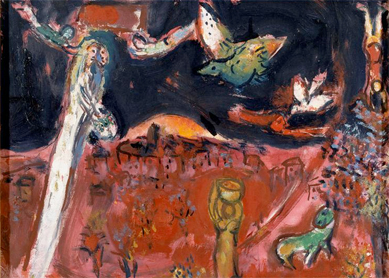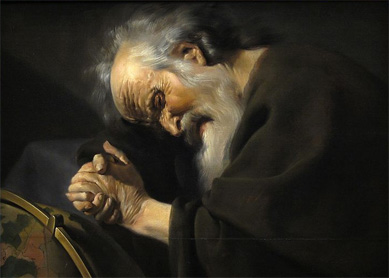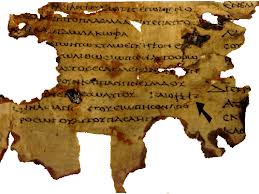The Song of Songs was originally a carefully crafted anthology of secular love poems celebrating the sensual, sexual, and erotic love between man and woman. Later, Jewish and Christian tradition transformed it into a sublime document of religious belief. This transformation was deemed necessary once the Song became part of the Bible because God is not mentioned in the book at all. In the often-quoted passage
The last line, “a raging flame,” is likely a superlative, but some suppose that it uses the name of God (‘esh shalhebetya) and thus read it as “the flame of Yah.” This lack of any reference to the divine may have prompted discussion about the Song’s inclusion in the canon. In the Jewish tradition, the rabbis silenced such a discussion by affirming that “Song of Songs is holy because it was said [under the influence] of the holy Spirit” (t. Yad. 2:14). Once the holiness of the Song was affirmed, it could be interpreted as a deeply theological document. Here the rabbis have to be credited with the use of a sophisticated allegorical interpretation, a mode of explaining a biblical text where characters or events represent or symbolize abstract ideas and concepts. In this model, the Song of Songs describes and praises God’s relationship to his chosen people and links the biblical text to the various stages of Israel’s history. This is reflected in the use of Song of Songs as reading for Pesach (Passover) since the eighth century C.E.
But within the Jewish tradition there are diverse interpretations of the Song. In addition to historical allegory we find influences of the Kaballah (during the Middle Ages) and Greek philosophy (especially Aristotle). The love of Song of Songs is seen as a relationship between divine and human intellect (for example, in the works of Joses ibn ‘Aknin and Moses ibn Timmon).
We cannot attribute an anti-erotic agenda to all allegorical interpretations as many—not only those in the Kaballah—are deeply erotic. In modern times, reflection on divine and human love and its relation to the Song and theology in general is present in the works of Gerson D. Cohen and in F. Rosenzweig’s Star of Redemption.
On the other hand, Christian interpretation since Hippolytus (ca. 170-235 C.E.) and Origen (ca. 185-254 C.E.) follows in Jewish footsteps and reads the Song allegorically. Here we find two main interpretative strands: the first is an ecclesiological reading of the Song where the poem describes the love relationship between Christ and his church. The second reading is mystagogical, in which the poem describes the relationship of an individual soul to Christ as bridegroom. Such an interpretation reaches its climax in the bridal mysticism of Bernard of Clairvaux (ca. 1090-1153) and in the St. Trudperter Song of Songs that interprets the biblical text for a community of nuns. Like their Catholic counterparts, most Protestant theologians continue to read the Song of Songs allegorically. During the period of the Enlightenment the Song of Songs was read as an ethical appeal for marital fidelity.
Despite the prevalence of the allegorical interpretation up to the nineteenth century, there were dissenting voices. Theodor of Mospuestia (ca. 350-428 C.E.) anticipated later secular interpretations and interprets Song of Songs as a wedding song, while Martin Luther (1483-1546) favored a decidedly political interpretation. According to Luther, Solomon gives thanks to God “for his divinely established and confirmed kingdom and government”.
The advent of the historical-critical study of the Bible and J. G. Herder’s forceful argument for Song of Songs as a collection of love songs led to a rediscovery of the original secular character of the text. This was supported by the discovery of love poetry from ancient Egypt, Mesopotamia, and the Greek world. The recognition of the secular character of Song of Songs allows scholars to explore a wide variety of issues such as the relationship of the sexes, a possible female authorship, or a Hellenistic date for the collection as a whole.
Bibliography
- Hagedorn, Anselm C., ed. Perspectives on the Song of Songs / Perspektiven der Hoheliedauslegung. BZAW 346. Berlin: W. de Gruyter, 2005.
- Exum, J. Cheryl. Song of Songs. A Commentary. Ed. James L. Mays, Carol A. Newsom, and David L. Petersen. Old Testament Library. Louisville: Westmisnter John Knox Press, 2005.





